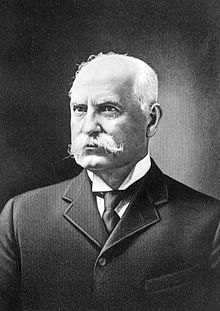Nelson W. Aldrich
| Nelson W. Aldrich | |
|---|---|
 |
|
|
United States Senator from Rhode Island |
|
|
In office October 5, 1881 – March 3, 1911 |
|
| Preceded by | Ambrose Burnside |
| Succeeded by | Henry F. Lippitt |
| Member of the U.S. House of Representatives from Rhode Island's 1st district |
|
|
In office March 4, 1879 – October 4, 1881 |
|
| Preceded by | Benjamin T. Eames |
| Succeeded by | Henry J. Spooner |
| Member of the Rhode Island House of Representatives | |
|
In office 1875–1876 |
|
| Personal details | |
| Born |
Nelson Wilmarth Aldrich November 6, 1841 Foster, Rhode Island |
| Died | April 16, 1915 (aged 73) New York, New York |
| Resting place | Swan Point Cemetery |
| Political party | Republican |
| Spouse(s) | Abigail Pearce Truman Chapman (m. 1866) |
| Children | Lucy Aldrich, Abby Aldrich Rockefeller, Richard Steere Aldrich, Winthrop W. Aldrich |
| Alma mater | East Greenwich Academy |
| Profession | Businessman |
Nelson Wilmarth Aldrich (November 6, 1841 – April 16, 1915) was a prominent American politician and a leader of the Republican Party in the Senate, where he served from 1881 to 1911. By the 1890s he was one of the "Big Four" key Republicans who largely controlled the major decisions of the Senate, along with Orville H. Platt, William B. Allison and John Coit Spooner.
Because of his impact on national politics and central position on the pivotal Senate Finance Committee, he was referred to by the press and public alike as the "General Manager of the Nation", dominating all tariff and monetary policies in the first decade of the 20th century. In a career that spanned three decades, Aldrich helped to create an extensive system of tariffs that protected American factories and farms from foreign competition. He was a party to the re-structuring of the American financial system through the institution of the federal income tax amendment, which he originally opposed. His most important contribution was the design of the modern Federal Reserve System. Deeply committed to the efficiency model of the Progressive Era, he believed these reforms would lead to greater efficiency. Reformers, however, denounced him as representative of the evils of Big business. Aldrich became wealthy with investments in street railroads, sugar, rubber and banking. He married into the Rockefeller family, and his descendents became powerful figures in American politics and banking.
Aldrich was born in Foster, Rhode Island, into a middle-class family descended from noted English immigrants John Winthrop, William Wickenden, and Roger Williams. His branch passed through generations of declining circumstances. His father was Anan E. Aldrich, a mill hand, and mother Abby Burgess. He attended public schools in East Killingly, Conn. and the East Greenwich Academy a boarding school in Rhode Island.
...
Wikipedia
